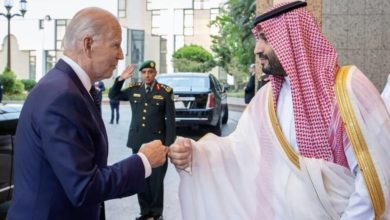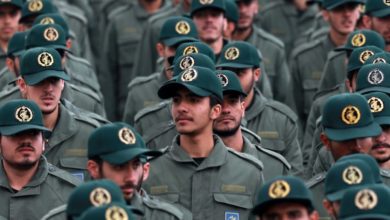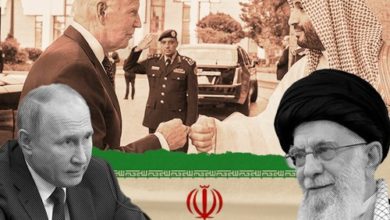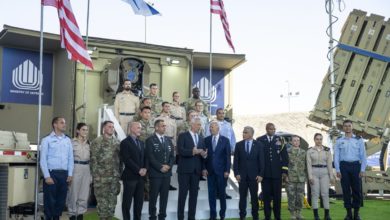 Rich with oil reserves, Iran dominates the eastern portion of the Middle East. |
The Chinese news agency also reported that Karim Qavami, the general in charge of Iran’s air force, threatened to shoot down unidentified aircraft violating Iranian airspace.
The aerial provocations are the latest U.S. attempt to increase pressure—political, economic and military—against the most powerful Middle Eastern country that maintains independence from Washington’s dictates. In his 2002 State of the Union address, George Bush labeled Iran as part of the “Axis of Evil,” along with Iraq and North Korea.
The threats against Iran are a component of U.S. efforts to gain complete hegemony in the Middle East. With the Iraqi Ba’athist regime out of power, Iran represents the only strong Middle Eastern nation that stands in the way of outright U.S. dominance in the region.
Part of the stepped up pressure against Iran is the propaganda against its nuclear program. In November 2004, just weeks after Bush was declared the victor in the presidential elections, outgoing Secretary of State Colin Powell accused Iran of attempting to develop nuclear warheads. He cited unspecified intelligence—following the same line he employed with the United Nations in the now-discredited accusations against Iraq’s supposed “weapons of mass destruction.”
David Kay, who led U.S. efforts to find weapons in Iraq, called the intelligence of Iran’s alleged nuclear missile program weak. “I was surprised that the administration put him out there or he put himself out there on this,” he told the Nov. 19 Los Angeles Times. “I thought if there was anyone in the administration that had been sufficiently burned by such sources, it would be Powell.”
The Nov. 19 Washington Post called the information leading to the charge “unverified.” It reported that the charges were based on a single source whose accuracy had not been confirmed.
The Iranian government denies any effort to build nuclear weapons. It has been developing a nuclear energy program as a way to decrease dependence on oil and gas.
The charges initially made by Powell and echoed since by the Bush administration were carefully timed. The International Atomic Energy Agency was in the midst of inspecting Iran’s nuclear enrichment process. Iran was involved in negotiations with Germany, France and Britain regarding a deal to alter its nuclear program in exchange for trade and technology.
Self-determination and self-defense
Pakistan, on Iran’s border, has nuclear weapons. So does nearby India, Russia and China.
Israel, the chief U.S. garrison state in the Middle East, is widely recognized as having nuclear missiles capable of striking any target in the region, including Iran. Of course, the U.S. is more than capable of launching a nuclear strike against Iran.
Given this reality, it is sheer hypocrisy for anyone—much less the United States—to deny Iran’s right to build nuclear weapons. It is a question of the basic right of nations to self-determination—to determine how to provide energy and how to defend themselves from attack. With 150,000 U.S. troops occupying neighboring Iraq, and 18,000 in Afghanistan, the danger of attack is real.
Indeed, the issue of nuclear power has become a matter of national pride for wide sectors of the Iranian people. “Iranians are united not because of activities by the Iranian regime, but because of the U.S. position,” Tehran-based scholar Abbas Maleki told the Nov. 14 Washington Post. “Now all Iranians believe we must promote our [nuclear] activities as a sign of independence.”
 Photo: Morteza Nikoubazl |
The reality, though, is that the U.S. threats against Iran have nothing to do with nuclear power—or even nuclear weapons. What concerns the U.S. ruling class the most is the existence of a regional power in the Middle East which is not beholden to Wall Street.
Iran is a country of 69 million people—by far the most populous in the Middle East. Its gross domestic product is $478 billion, according to a 2004 CIA estimate—an economy more than twice the size, for example, of Greece.
Iran is also OPEC’s second largest oil producer. Ten percent of the world’s proven oil reserves are in Iran. It has the second largest natural gas reserves in the world. Since the 1979 Iranian Revolution, this vast wealth lies completely outside the U.S. sphere of exploitation.
Of course, Iran’s revolution was not a socialist revolution. Its economy is still capitalist. The development of an independent national bourgeoisie that resists the dominance of U.S. imperialism has meant that the Iranian government has relied largely on trade with the other imperialist powers—Europe and Japan—along with China.
That explains the role that the big European capitalist powers—Germany, France, and Britain—are playing in the nuclear dispute with Iran. They have offered to help Iran build a light-water nuclear reactor if the Iranian government drops its nuclear enrichment program. They also promised closer economic and political ties.
On Nov. 22, Iran announced that it was temporarily suspending its nuclear enrichment program. After the government agreed to IAEA inspections in December, the EU resumed trade talks with Iran on Jan. 12.
For the U.S. government, this development has two aspects. On the one hand, it is hoping to be able to force the European powers to take the lead in efforts to force Iran into the kind of inspection regime that Iraq was submitted to in the years prior to the 2003 U.S. invasion. On the other hand, Washington is clearly reluctant to see a growing role for the European imperialists in the Middle East.
U.S. government tactics toward Iran are guided primarily by its inability to create a stable puppet regime in neighboring Iraq. With the growing realization that hundreds of thousands of U.S. troops will be required to occupy Iraq for the foreseeable future, plans among the most hawkish sector of the U.S. ruling class for an invasion of Iran have been shelved.
The Bush administration’s Jan. 9 removal of John Bolton from his State Department post is an indication of this new reality. Bolton was one of the main advocates of aggression and sanctions against Iran. He has been a key architect, along with Dick Cheney, Paul Wolfowitz and others, of the Bush administration’s foreign policy leading up to the invasion and occupation of Iraq.
That does not signal that U.S. aggression against Iran will end. While tactics may shift, the overarching U.S. goal of hegemony in the Middle East puts an independent Iran on a collision course with U.S. imperialism.





